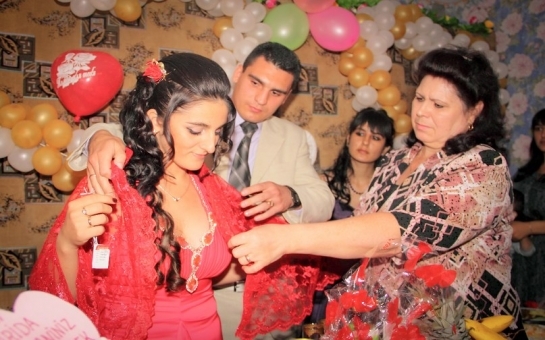L. Gasimova
Once I became a witness to an engagement in a village of the Khachmaz region, where there is still no running water or gas.
People live in the old way, using water from a spring, flushing an oven and cooking food on a fire and chopping firewood in the forest nearby. Earlier, in the times of the Soviet Union, there were huge forests, and now little has remained of them. In the village there is still no paved road. And when there is rain, the roads turn into mud mess. The people are very poor and very few ones in the village have stone fences.
There is no work in the village, so young people and men travel either to Baku or Russia for work. They leave their women and children, on whose shoulders lie the difficulties of rural life. So if anybody makes a wedding in that village, then it is a holiday for everyone.
Some people are so poor that they cannot collect a dowry to their daughter. They take a loan and then pay it back for years.
What is interesting, girls from this village are taken like hot cakes. No one not even bothers that local girls learn up to the 4-5 class and then work at home, in the garden, help to educate their little brothers and sisters. In this village, there is only a primary school, and then the children go to study in another village 3 km on foot, as in this village there are no buses. The road is made from clay, at best, from gravel. Even if you want to come here, you will have to hire a taxi, because buses never come to this place.
Here, people are willing to accept any help. If someone gives them old clothes, everything will be OK. If you ask to bake bread or kutab (a sort of local pancake), the women will never fail. The local people like shor (a sort of local salty cottage cheese) very much and there is even an anecdote about it.
"An Azerbaijani guy brought a Russian bride to the village. All day long on the table there was salty cottage cheese. The girl once broke down and said: "In the morning we have salty cottage cheese, and the same food at lunch, and then in the evening again - always salty cottage cheese. Well, I'm leaving, but this lime will destroy you."
So, one city boy decided to marry a girl from the village. The groom and the bride were liked and welcomed. They decided to conduct the engagement. Although the groom was also not out of the rich, for this event they decided to spare no money. They bought two rams and ordered a big cake with a picture of the bride and groom. The groom's relatives brought "Khoncha" - baked sweets, candies, clothing, a diamond engagement ring and a gold chain from his aunt.
The groom's mother herself had never seen diamonds, but for the future daughter-in-law, at the urging of her son, she bought a diamond ring.
The son recently became a believer to prayers to heal his father from addiction to alcohol. So he decided that his wife must also be religious. Although the village is not that religious, if you want to get married, and even move to the city, you can wear a scarf as well. The girl put on the hijab (a Muslim woman's scarf) and was immediately put in a room with other girls, who were looking with envy at what was happening.
I was more struck by the fact that the bridegroom immediately called the mullah, who announced the two young people married on the phone and asked the groom to bring the fee (30 manats) to the mosque. That's how it is possible to get married now in the religious way - you should just call on the phone and that is done!
What unpleasantly surprised us, urban women, was that the mother of the bride came to the guests in a dressing gown, with her hair not combed and with rubber flip flops on her feet. And local ladies looked as if they had just been working in the garden, put on what came to hand, even not patting their blouses and skirts.
But residents of the village were not bothered, they were excited and happy. They danced from the heart and considered the bridegroom and the gifts that were brought from the city. The music blared from a small tape recorder with audio cassettes.
Tables were set for a chat in the garden, separate for men and for women, separated by a curtain. Men always sit separately from women there. The table was, of course, rather poor, but the bride tried her best. She baked cookies and cakes and cooked the Capital salad.
The bride's aunt cooked dolma and pilaf, which was not like our delicious tasty pilaf, but rather looked like a porridge. Yes, the bride will have to learn how to cook our national food, of which the rest of Azerbaijan is proud. It was all too easy. Utensils, chairs and tables were collected from the neighbors.
Thoroughly eating, the fans of weddings again began to dance. Our women are very fond of tea and dancing.
Then they brought the bride, who was wearing a ring, and the young couple cut the cake together. The bride's mother immediately took the bride's half-cake home, and the groom's half was also not given to treat the neighbors and was hidden at home. I do not know how to explain this - with poverty or greed, although the groom's relatives brought about 10 kg of candies, and baked pastry on three dishes.
Then, the bride's aunt and her neighbor served "sweet tea", though it was already out of place, since the agreement had already been received for a long time, and now the engagement was held. No money was put and no one drank the tea. The bride's mother just decided to try to play a trick on the guests and to make them pay. But our urban women understood the cunning mother-in-law and did not put the money expected on the table.
Since our bride and groom are believers, alcohol was not served and it was evident that the men were somehow feeling uncomfortable. But their fathers, lovers of strong drinks, yet secluded and had some alcohol for the happiness of the young. By the end of the event they were "drunk" and they did not care what others may think of them.
The city guests were tired and had to go home. The bride decided to see off the new relatives and took off her high heels and came out, like her mother, in her old rubber flip flops and a beautiful long dress with a hem trailing in the dust.
But, as it turned out, the groomsmen had urgent business and they left, leaving the family to fend for themselves. The women, men and children piled into two cars with difficulty - 8-9 people in each vehicle - and left the place. But the groom decided to stay and continue to communicate with the bride, thinking , perhaps, to charm her to the end.
The village people were very happy with the event, but the city people were not very happy. But this is not the most important thing. It is more important to have a new durable union for the happy newlyweds.
ANN.Az











